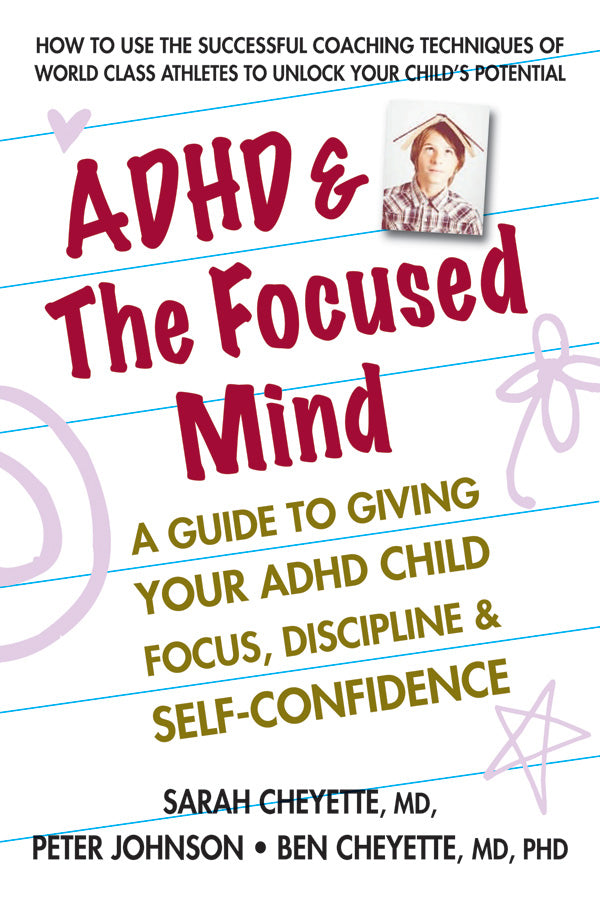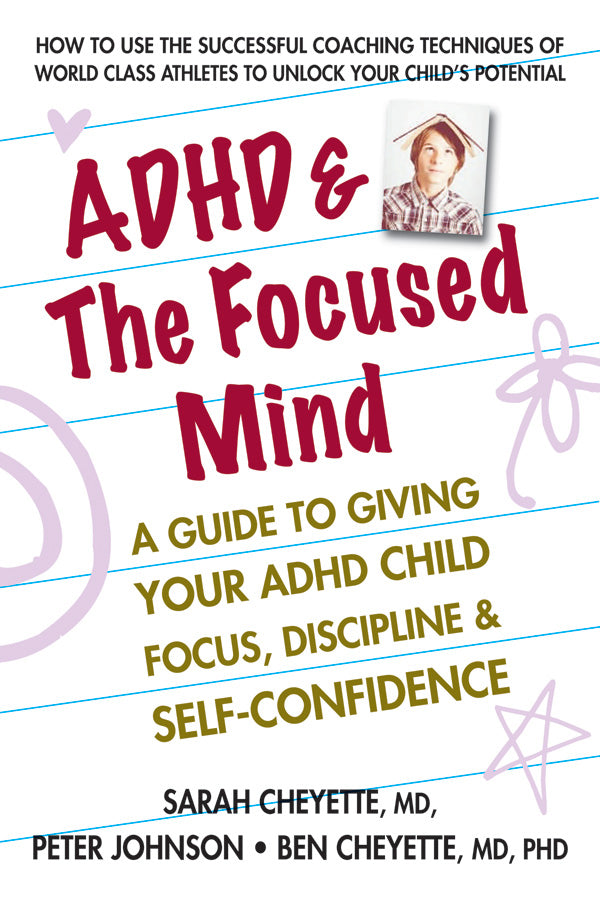Winner of the IBPA Benjamin Franklin Award for Best Parenting Title
One of the "100 Best ADHD Books of All Time" (BookAuthority.org)
As a young boy, his difficulty in concentrating was diagnosed as ADHD. In school, his mind always seemed to wander until he found an activity that he liked. By using that one activity, his mother was able to reach past her son's ADHD and teach him focus and self-discipline. That boy, Michael Phelps, went on to win twenty-two Olympic medal and break thirty-nine world records in swimming. World class athletes like Phelps all share an underlying skill: The ability to clearly focus on the task that is in front of them. Acquiring this very skill to overcome ADHD is the subject of ADHD & the Focused Mind. Written by three experts in their fields—a pediatric neurologist, a psychiatrist, and a martial arts instructor—this breakthrough title provides a unique program for instilling the ability to focus in children with Attention Deficit Hyperactivity Disorder.
The book begins by explaining the basics of ADHD, including its common signs and what researchers have discovered about it. The remaining chapters detail the components of the program, including its principles, its goals, and the practical ways in which these goals can be achieved. The authors recognize that all children are different, so the program has the flexibility to work within a child’s comfort level while still attaining the necessary level of focus. The text concludes with a discussion of medications for ADHD, and how to decide what’s right for your child.
Some of the most successful people in the world have ADHD, but just like star athletes, they have discovered that developing their own unique ways of focusing enables them to get ahead. ADHD & the Focused Mind provides coaching techniques that can profoundly improve the life of any child with Attention Deficit Hyperactivity Disorder.
Dr. Sarah Cheyette, MD graduated cum laude in Cognitive Neuroscience from Princeton University, and received her medical degree from the David Geffen School of Medicine at UCLA in Los Angeles. Following specialty training in Pediatrics at Cedars-Sinai Medical Center in Los Angeles and Pediatric Neurology at Seattle Children’s Hospital and Regional Medical Center, she settled with her family in the San Francisco Bay Area and established a private practice. She currently has a pediatric neurology practice at the Palo Alto Medical Foundation, where she focuses on the treatment of ADHD. Visit her website at https://sarahcheyette.com/.
Peter Johnson received his BA in English Literature from Hayward State University, California, and began his quest for growth and learning. He holds the rank of Seventh Degree Black Belt in Karate, and has been teaching martial arts since 1993. Peter’s philosophy is that martial arts is not simply about acquiring physical skill, but more importantly is about acquiring a drive for excellence in all areas of life. He has contributed to a comprehensive Martial Arts and Character Development program for children and families at his school in San Bruno, California. With his experience in the Martial Arts and his Certified Elite Instructor status in Tae Bo Fitness, Peter's approach to training creates a blend and balance of body, mind, and spirit.
Dr. Benjamin Cheyette, MD, PhD is a graduate of Princeton and received his professional degrees from the David Geffen School of Medicine at UCLA , followed by specialty training in psychiatry at the University of Washington in Seattle. Currently, he is a professor of psychiatry at the University of California, San Francisco, where he sees patients, teaches medical students and psychiatric residents, and runs a scientific laboratory exploring the molecular origins of psychiatric illness. In his clinical practice, he treats patients with ADHD.
Acknowledgments
Foreword
Preface
Introduction
1. Understanding ADHD
2. Own the Goal and Play to Win
3. Setting S.M.A.R.T. Goals
4. Super-S.T.A.R.
5. Mind, Body, and Spirit
6. The Will to Win Is Nothing Without the Will to Train
7. T.E.A.M.
8. Failure Is Temporary, Defeat Is a Choice
9. Picking the Perfect Coach
10. The Prescription Decision
Conclusion
Resources
Homework Log
References
About the Authors
Index
“[A] fresh and practical approach . . . offers an alternative to medication . . . emphasizes sports analogies and practices such as teamwork and ‘playing to win’ . . . contains a plan to help children improve focus and set S.M.A.R.T. (specific, measurable, attainable, realistic, time-defined) goals . . . [a] section on mind, body, and spirit reveals how keeping all three in balance can enhance goal achievement . . . [p]arents and kids will find plenty of useful ideas in this innovative, ‘athletic mindset’ approach to tackling ADHD.”
"Filled with resources and further reading to assist parents, teachers, and coaches, this manual will aid those with ADHD to learn to hone their attention skills in ways that will be familiar to those who enjoy and participate in sports."
Fifteen-year-old Andrew was extremely angry and frustrated. While he excelled at playing soccer, he wasn’t doing well in any of his school classes. His parents didn’t know what to do with him, and he didn’t want to deal with them. They were in the doctor’s office, the end of the line. His parents didn’t really want him on medication for his ADHD, but they were at a loss. He was always in a bad mood and they suspected he was smoking marijuana. He was failing school, despite the fact that he was a smart kid. The one bright spot in his life was soccer, where he was the star player on his team. Was medication the only way out?
The doctor asked him one question, which Andrew later said changed his life: Can you apply what you learned on the soccer field to school and to the rest of your life?
If you are a parent of a child with ADHD, the behavioral issues described above may sound all too familiar. ADHD, attention deficit hyperactivity disorder, is a condition in which people have greater difficulty than average focusing their attention, especially in situations they don’t find interesting. This can cause challenges with functioning in daily life because to a large extent, accomplishment depends on the ability to focus on a task at hand, no matter whether the task is interesting or not. Everybody can have trouble focusing at times. However, ADHDers have a harder time focusing—and focusing in more situations—than average.
You can’t control your child’s in-born intelligence, and you can’t control whether or not your child has good teachers, the way your child’s school assesses its students, or how difficult a teacher makes a test. However, with the right advice, training exercises, and practice, you can improve your child’s motivation, organization, time management, perseverance, attitude, and social skills—and your child will be more successful in all of these areas and more.
The goal of this book is to give ADHDers and those who want to help them the tools they need to achieve excellence in any area they choose. We believe that our approach will help virtually every child with ADHD without side effects, and for the minimal cost of this book and the time and effort you and your child put into it. The training we advise can be accomplished on your own time and on your own schedule—as fast or as gradual as you want. It is designed to create a process for success that you can help your child apply to whatever he wants to accomplish in life.
Our approach involves using the training techniques of world-class athletes. Not the physical training techniques—this book is not about coaching ADHDers to run a four-minute mile, shoot winning baskets, or land the perfect “ten” in gymnastics. Instead, this book is about teaching ADHDers how to develop the same intense focus and commitment that athletes use to attain their performance goals. This is called the athletic mindset. By doing this, the ADHDer can take these skills and apply them to any aspect of performance in his life.
Just as athletes improve their athletic skills through proper coaching and training, ADHDers have mental skills that they can improve through proper coaching and training. Both ADHDers and athletes need to identify challenges, set goals, and train hard with a coach. A person with ADHD who does this can break away from a cycle of underachievement or outright failure to become a world-class success story.
Many kids with ADHD already participate in sports; they already understand the athletic mindset that includes trying your best, participating fully, and constantly setting new goals for achievement. Many kids with ADHD become willing to make changes and confident in their ability to make these changes once they understand that all they have to do is take their “athlete self” and apply it to their “school self.” They realize quickly that if they can do it for their coach or their team, they can do it for themselves as students, sons, and daughters.
Nevertheless, we emphasize that this book is not only for athletes who have ADHD. You can also easily apply the techniques in this book even if your child has no interest in sports. Our message is that anyone can use the attitude of competitive athletes to overcome the obstacles that ADHD throws in the way of success.
Athletes identify their weak areas and work on them in training. Athletes measure how they are doing today and set specific goals for what they want to improve in tomorrow’s workout. Athletes work with coaches to help them through their rough spots and keep them motivated until they reach their long-term goal. They give their all to achieve that goal and they give their all to excel.
In this book, we show you how to use these same tools to strengthen your child’s achievement. How can your child become faster at accomplishing tasks at school or at work? How can your child keep from getting distracted—i.e., how will he “keep his eye on the ball?” How do you keep his motivation going if he has a setback? The principles are the same whether one is talking about performance in sports or in other areas including school, work, or personal relationships.
In the coming chapters, you will learn about how the ADHD brain works. We begin in Chapter 1 by defining ADHD and identifying common symptoms and behaviors associated with it. We also explain some of the biology behind the brain with ADHD.
Then, in Chapters 2 through 4, we discuss the importance of goals: how to fully commit to a goal, what criteria are important for setting a goal, and how to stick with that goal until it becomes a reality. Having a goal gives your child something to focus on. When a goal is achieved, the child feels an important sense of accomplishment and pride, which encourages him to continue setting bigger goals. We discuss how to organize goals and how to set up a clear, step-by-step, and realistic timeline for achieving them.
In Chapters 5 and 6, we discuss how an ADHDer can learn to focus and achieve, and apply these skills to his everyday life. We present fundamental exercises to help ADHDers concentrate better. These include techniques to focus the eyes, mind, body, and spirit, which all work together to create motivation in your child.
Chapter 7 invokes how your child can best utilize the help of those around him—for example, his teachers, friends, and even his “competitors” in the classroom. Some children with ADHD have trouble working with a team, especially if the other team members do not fully understand ADHD. This chapter provides strategies for your child to succeed when working with others.
Improvement sometimes comes in two steps forward and one step back. Just as an athlete is going to lose sometimes, an ADHDer is going to have times where he doesn’t feel things are going well, or doesn’t reach his goal. Many kids give up when they are faced with failure, even if you think they should respond in a different way. Changing this attitude of dejection in response to setbacks is essential for a successful life. You will learn strategies for dealing with, and recovering from, disappointment and failure—strategies that allow your child to go forward and continue to reach for his goals—in Chapter 8.
Chapter 9 discusses the growing practice of working with an ADHD coach, and how to find the perfect coach for your child. In some cases, parents decide to coach their own children. Wouldn’t it be great if your child viewed you as part of the team—instead of the enemy? As a parent, you will learn what strategies are important for coaching ADHDers. How much do you push? When do you hold back criticism because of ADHD? We also provide tips for finding an outside coach.
Finally, in Chapter 10, we discuss some of the issues ADHDers and their parents weigh when deciding whether or not to take medication. We will explain the benefits and the potential side effects of the most common ADHD medications.
If you are reading this book, you are probably looking for an answer to the challenges posed by ADHD in your child. With this book, we not only hope to energize you and your child on that journey, but to do more. We want this book to jump off the page and shift your spirit. We want this book to kick you in the pants and give you confidence about helping your child. We want this book to be the means by which your child has an excellent—not just an average—life!
We three authors approach this from different backgrounds, which contribute to the uniqueness of this book. Ben and Sarah Cheyette are physicians. Ben is a practicing psychiatrist, but he also has a PhD in Molecular Biology and runs a lab that researches brain development. Sarah is in clinical practice as a neurologist and sees many patients (both kids and adults) with ADHD. Peter Johnson is a seventh-degree black belt in Okinawan Karate. His connection to ADHD comes from training many people with ADHD in his dojo (school) and his dedication to teaching them martial arts. Ben and Sarah connected with Peter at Peter’s dojo and we all realized that the mental techniques Peter uses to teach people how to be better athletes could be more widely applied to all aspects of ADHD. All of us share a passion for helping people to be their best.
We aim to give you a novel, easy-to-understand approach that is about changing both mindset and behavior. We will introduce simple but powerful concepts that will motivate your child and keep him on the road to success.
Having a desire for success is good, but achieving success takes more than desire—it is a task that requires effort to actually make it happen, and practice to make it a habit that happens again and again. We believe that the spirit that develops in athletes through their training, and that your child can develop with the help of this book, can link desires to long-term success. We want your child to develop and to use this winning spirit to combat the challenges of ADHD. Not everyone can become an Olympic-level athlete. But everybody can develop the mindset that an Olympic athlete uses to achieve his goals, and everybody can apply that mindset to their own personal arena of performance and achieve a gold medal in life!
Authors' blog (housed through PSYCHOLOGY TODAY):
https://www.psychologytoday.com/us/blog/1-2-3-adhd
Book's website is: www.adhdandthefocusedmind.com.





